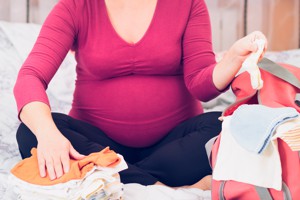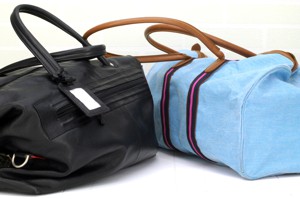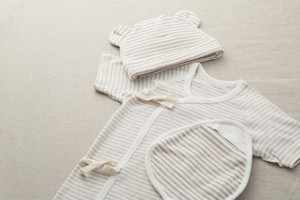 If your due date is getting ever closer then it’s time to start thinking about those hospital bags. Unfortunately, the days where you could just take a change of clothes and a toothbrush for an overnight stay have passed now that you have entered motherhood, and there are lots of things that you will need for your trip to the hospital to give birth.
If your due date is getting ever closer then it’s time to start thinking about those hospital bags. Unfortunately, the days where you could just take a change of clothes and a toothbrush for an overnight stay have passed now that you have entered motherhood, and there are lots of things that you will need for your trip to the hospital to give birth.
Planning a home birth? You should still aim to pack a bag in case something doesn’t go according to your plans and you end up being admitted to your local hospital. Furthermore, it’s a good idea to pack for at least two nights in the hospital, again in case something goes wrong.
If you are not sure what to pack, have a read through this handy guide that covers both the essentials and optional extras. Remember, whilst your hospital might have some limited basic supplies, you can’t rely on them to provide everything you need, which is why it is best to be prepared. You may find that your maternity unit has strict rules on what personal items can be brought from home, for example, you may not be allowed your own pillow, etc. so check with them in advance.
Items For You
 It’s not just about being prepared for the baby, there are a number of things that you will need for yourself during your hospital trip. Some are essential and practical, others will just make things that little bit easier.
It’s not just about being prepared for the baby, there are a number of things that you will need for yourself during your hospital trip. Some are essential and practical, others will just make things that little bit easier.
Your Green Maternity Notes
These are essential, as they contain all of your medical information.
Clothing
Expect to get messy during labour, so don’t pack your best clothing for the hospital. You could also include a couple of plastic bags to chuck any soiled clothing in.
- Pyjama tops or old t-shirts that you don’t mind getting blood, et cetera on during labour
- A dressing gown to keep you warm
- A couple of pairs of loose pyjamas to wear on the post-natal ward (If you are breastfeeding look for something that opens at the front)
- A dressing gown
- Socks and slippers for keeping your feet warm as they can get cold during labour
- Disposable maternity knickers, or loose old knickers that you are happy to get stained with blood
- Nursing Bra for if you are planning on breastfeeding (You can get fitted for one at 38 weeks pregnant)
- A going home outfit – choose something loose and comfortable, as it will be a little while before you can fit back into those pre-pregnancy jeans
Toiletries & Other Hygiene Items
- Shampoo, shower gel or soap, and a flannel for a post labour shower / wash
- A towel in case the hospital doesn’t supply them
- Toothbrush and toothpaste
- Deodorant
- Facial wipes – will help keep you cool during labour and freshen you up
- Lip balm and moisturiser – the combination of labour and hot hospital wards can have a drying effect on your skin
- Make-up – If you’re someone who can’t have a picture taken without a bit of foundation and lippy then make sure you pack some for those first pictures with your baby
- Hairbrush and clips / hairbands, et cetera
- Maternity Pads – For the post-partum bleeding; They are bulkier than regular sanitary towels and able to handle blood flow that is heavier than a normal period (You cannot use tampons until after your post labour check at six weeks)
- Breastpads – You might not need them straight away, but some women do find that their breasts leak after labour; The pads fit comfortably in your bra and prevent any embarrassing wet patches appearing on your clothing
- Lansinoh Lanolin Cream – This is a protective barrier cream that you can put on your nipples before and after breastfeeding; It can help relieve sore nipples and is perfectly safe for your baby
Snacks & Refreshments
Although you can get food in the hospital, you should take along some snacks and drinks to keep you going during labour, so that you are not relying on the hospital shop or vending machines. Look for foods high in carbohydrates to give you an energy boost and foods that don’t require any preparation. Cereal bars and crisp breads are good examples of these.
You will get water in hospital, but you might want to pack some straws so that your partner can hold the drink for you if necessary. Fruit juices and isotonic drinks are a great way of keeping you hydrated and keeping your blood sugar levels up so you could include a few of them, as well.
Optional Extras
These items aren’t essential, but you might want them to make your labour more comfortable and enjoyable.
- Books and magazines to read – useful if your early labour is taking a while to progress or you end up having to stay on the postnatal ward for a while
- Tablet computer and charger – You can download items from the BBC iPlayer to watch offline, using the iPlayer app; You could also add some games or magazines (Some hospitals also have free Wi-Fi allowing you to video call long distance relatives)
- Mobile phone and charger
- Camera – For those special first moments
- CD’s – Some units will allow you to bring your own music in to listen to during labour
- Your own pillow, if that would make you feel more comfortable; You could also take a v-shape pillow which is great for breastfeeding
Items For Your Birth Partner
 Some hospitals will allow your partner to stay overnight, others have strict visiting times even for partners. Either way, it’s a good idea that your partner has a few supplies of their own in case of any emergencies, etc.
Some hospitals will allow your partner to stay overnight, others have strict visiting times even for partners. Either way, it’s a good idea that your partner has a few supplies of their own in case of any emergencies, etc.
- A change of clothes
- Mobile phone and charger
- A list of important phone numbers in case there is a problem with mobile phones
- Snacks and refreshments
- Plenty of change for the hospital car parks and vending machines
- Paracetamol – Your partner might develop a headache from being awake all night or from the heat on the ward and hospital staff will not provide them with medication, so it’s a good idea to pack some
Items For Your Baby
 If you prefer, you could have a separate bag for you and a separate bag for your baby with everything he or she will need. Don’t forget you will also need the car seat for the journey home!
If you prefer, you could have a separate bag for you and a separate bag for your baby with everything he or she will need. Don’t forget you will also need the car seat for the journey home!
- Three sleepsuits and three vests – when dressing your new-born he or she will need one more layer than you
- Hat to keep your baby warm post birth and on the journey home
- A going home outfit – including outerwear such as a snowsuit during colder weather that can be removed once your baby is in the car
- Socks / Booties
- Blanket for the journey home
- Nappies – expect to use up to ten a day during the first few days so make sure you have enough for a couple of nights if required
- Cotton wool pads – to clean your new born baby’s delicate skin
- Vaseline – putting a base layer of Vaseline on your baby’s bottom after each nappy change will make the meconium (the substance that makes up your baby’s first poo) much easier to clean off – it’s very sticky!
- Formula – Even if you are planning on breastfeeding, you never know when something might go wrong, so it’s good to have a backup just in case (Some formula manufacturers do special hospital packs that include pre-mixed milk and sterilised teats)
- Muslin squares – for mopping up spit ups and protecting your own clothes
Other Items
For Hospital Staff
 This one isn’t essential and very much down to personal choice, but you could pack some chocolates or biscuits for the midwives – it will be greatly appreciated!
This one isn’t essential and very much down to personal choice, but you could pack some chocolates or biscuits for the midwives – it will be greatly appreciated!
For Your Older Children
If you already have a child then hopefully you will have a plan for their care during your labour. However, it’s a good idea to think about what happens if those plans fall through and they end up accompanying you to the hospital. You could pack a small bag of toys, clothes, etc. for them, and include a list of emergency contact numbers.
The arrival of a new sibling can be a difficult adjustment. If your older child or children will be coming to visit you and their new sibling on the ward, then one thing that many mums recommend is having a small gift that the baby can “give” to the older child as a greeting present.
When To Pack The Hospital Bag
You are considered full term once you reach 37 weeks and you could go into labour at any time after this point. Some women do go into labour earlier though, so it’s a good idea to have everything ready by this point at the latest.
Once the bag or bags are packed, you could leave them in the boot of your car if there is room, to save having to sort them out once you need to set off to the hospital.
